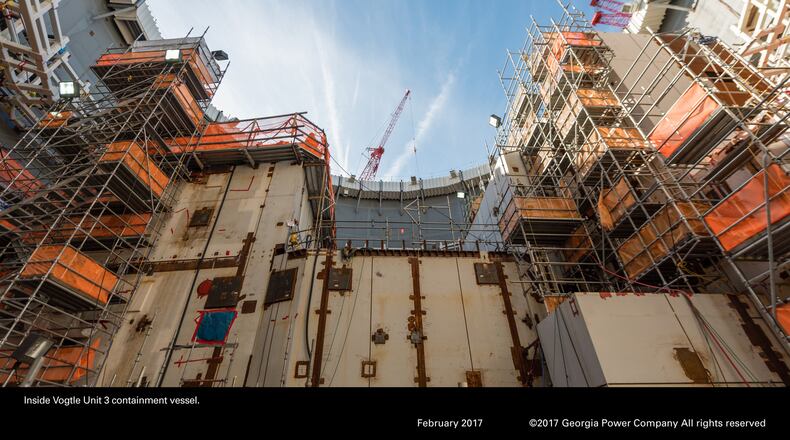Georgia Power and Westinghouse Electric said they reached a tentative agreement for the Atlanta utility and Southern Nuclear to take over management of the troubled Plant Vogtle project indefinitely from the bankrupt contractor.
The new agreement, announced Friday night, will take effect “once the current … construction contract is rejected in Westinghouse’s bankruptcy proceeding,” the companies said.
The two companies said an existing interim agreement, which was set to expire Friday, will be extended to June 3 to give the parties time to finalize the new deal and get required approvals, including from the bankruptcy court. Atlanta-based Southern Company is the parent of both Georgia Power and Southern Nuclear.
Georgia Power did not indicate in its terse statement what its long-term plans are for the nuclear expansion project.
“Georgia Power will continue work to complete its full-scale schedule and cost-to-complete analysis and work with the project co-owners (Oglethorpe Power, MEAG Power and Dalton Utilities) and the Georgia Public Service Commission to determine the best path forward for customers,” the company said in a press release.
Since the late-March bankruptcy of Westinghouse, the project's key contractor, Georgia Power has been spending about $50 million a month under the extended contract to continue building two new nuclear reactors at the plant near Augusta.
Georgia Power and Southern told state regulators Thursday that they have been gathering information at the site and from Westinghouse to determine what to do in the wake of the bankruptcy filing.
Westinghouse, which is reorganizing under Chapter 11, provided the designs for the new reactors and had been overseeing construction.
Westinghouse is owned by Japanese conglomerate Toshiba. It is expected to seek to exit the Vogtle project as part of its bankruptcy reorganization. Georgia Power and Southern say they are looking at all options, including completing construction under different management, converting the project to another type of power plant, or abandoning it.
The project is well over $3 billion over budget and more than three years behind schedule.
About 6,000 employees and contractors are working at the site, with about 43 percent of the construction completed, utility executives told the Georgia Public Service Commission at a hearing Thursday.
Georgia Power officials said the project slipped at least four months farther behind schedule in the second half of 2016, and has fallen farther behind this year. They said they no longer expect the project to be finished by the end of 2020, the latest date the company had projected.
Georgia Power and its partners such as Oglethorpe Power and MEAG are bankrolling the project with more than $8 billion in federal loans and loan guarantees. Georgia Power has also collected nearly $2 billion paid through “financing” surcharges that add about $100 a year to residential customers’ bills.
Critics say the $20 billion project isn't needed because demand for electricity has been largely flat in Georgia since the PSC approved it in 2009, even though the state's population has growth about 6 percent since then.
Experts says the slowed electricity usage has resulted partly from more efficient lights, appliances and heating and cooling systems, and partly from slower economic growth since the Great Recession.
About the Author
Keep Reading
The Latest
Featured


